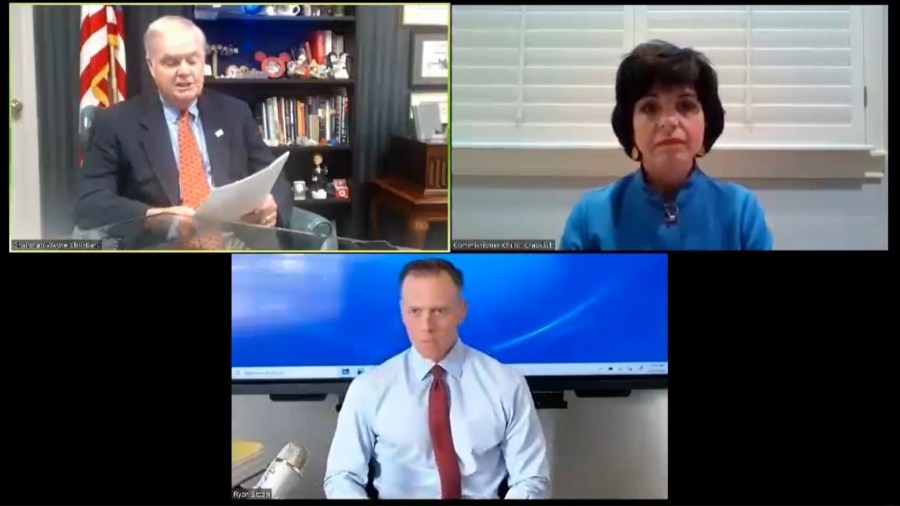AUSTIN (Nexstar) — The Texas Railroad Commission, the state’s energy regulating agency, held off on limiting oil production in response to plummeting demand and oil prices.
This year’s COVID-19 pandemic has caused drastic drops in travel, leading to less fuel use. The last time the state stepped in and cut output to respond to a decrease in demand was in the early 1970s.
Some oil producers asked the commission to prorate 20% of of the state’s oil supply. Opponents of the plan urged the three-member commission to allow the free market to run its course.

Commissioner Ryan Sitton said he was ready to vote to prorate 20% of oil production starting June 1 contingent on 4 million barrel/day reduction by other states, Canada or Organization of the Petroleum Exporting Countries (OPEC) allies. He said the proration should only apply to producers exporting over 1,000 barrels per day and should be done by operator and not by lease. When market demand gets back to 85 million barrels per day, Sitton wants the proration to lift automatically.
“The basis for the new allowable should be the maximum of their production in October, November and December,” Sitton suggested. “So, whichever month they produce the most, that becomes their maximum, and when that becomes the current basis, and then we set the allowable at 20% of that.”
Craddick posed a series of questions about how the state would enact the proposals, questioning the legality of the plan.
“I’m not sure, by law, if what you’re proposing is legal or not,” Craddick said of Sitton’s proposal, asking to hear from the Texas Attorney General’s office before making a formal motion.
“Can we legally prorate statewide or must we do it field by field?” Craddick asked.
“This is going to the courthouse and we really need to think about that, too,” Craddick said.
Chairman Wayne Christian said he was hesitant to act, wanting more information from how other states and the federal government were approaching the situation.
Sitton said inaction by the commission would not be acceptable, but said action would need to be contingent on other states or countries also taking similar measures.
“Taking weeks, even days right now to act, is in itself a choice,” Sitton said. “We have to inform our decisions with the fact that what took 30 years before is now going to take two months, with our own level of urgency.”
“We’ve seen the price of oil go from $50 a barrel down to -$37 a barrel,” over the last six weeks, Sitton said.
During the meeting, Chairman Christian announced the formation of a blue ribbon task force to work on ways to strategize on economic success for the oil industry.
“The goal is to save as many jobs, enable operators to survive. returned to a robust level as quickly as possible,” Christian said.
Some state lawmakers voiced concerns about what the commission’s options were.
“What would the state do?” questioned State Sen. Kel Seliger, the Republican representing the Permian Basin and the Panhandle.
“The state isn’t going to send everybody a check based on their losses,” Seliger said. “The state cannot really artificially set the price of oil because it’s an international market.”
“I don’t know what the Railroad Commission can exactly do,” Seliger said.
“The market will correct itself over time, it always has, but the effects will be very, very difficult,” Seliger explained, adding a suggestion to impose tariffs on Saudi Arabian oil.
State Sen. Pete Flores represents the stretch of Texas from San Antonio to El Paso, including areas where the oil industry dominates.
“When all possible, you want to make sure that that the free market works as it should,” Flores, a Republican, said.
“Sometimes you have to go outside of what you normally do when when you’re dealing with abnormal circumstances,” Flores said. “But still, you’ve got to maintain defenses of proper government and that is, you know, the rule of law, the Constitution, etc.”
Todd Staples, president of the Texas Oil & Gas Association, issued the following statement after the commission met Tuesday.
“Today, the Railroad Commission made the right decision to not vote on government-mandated oil production cuts. We appreciate the Commission’s interest to support producers, but proration would make matters worse, not better. Producers are acting to reduce production, and the state and federal governments are exploring additional options to assist. We applaud the Commissioners for maintaining regulatory certainty, which is essential to economic recovery, and encourage them to focus on recovery not on creating a cartel.”
The commission meets again on May 5, when Sitton said he and his staff planned to propose a formal order that would be ready for a vote.
“If our charge as Railroad Commission is to do things to bring supply and demand somewhat closer into balance, then to do that, we’ve got to lead other people,” Sitton said in an interview after the meeting.
“This is the time for us to move urgently because really, what’s what’s at jeopardy here if you watched the hearing is… American energy independence,” Sitton said. “That’s what very well may be hanging in the balance.”
















